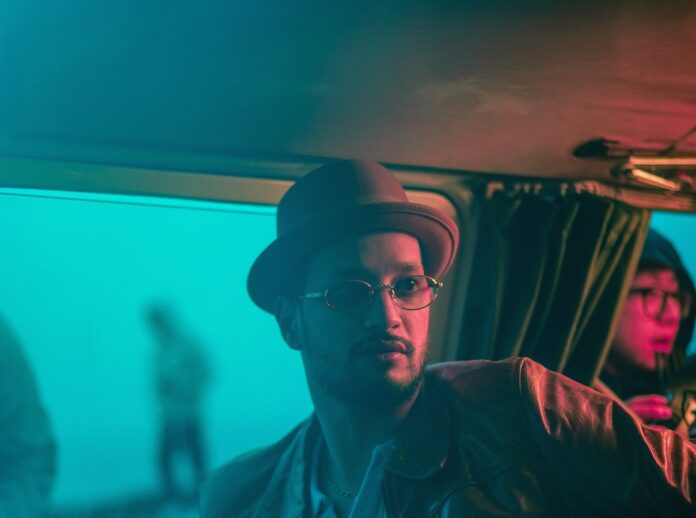DUBAI: The first track on Soolking’s latest album, “Sans Visa,” is called “Kurt Kobain.” It’s a nod to his roots as a fan of Nirvana and other grunge bands who started his music career as a drummer in a rock band in his native Algeria.
It’s just one example of the wide array of music that Soolking (real name Abderraouf Derradji) enjoys listening to and is influenced by, even if that influence isn’t always clear in his own material.
“I listen to a lot of different music, so my influences were a little bit from everywhere,” Derradji tells Arab News. “From the traditional music of Algeria, like ra?, American rap, French rap, reggae music, pop music like Michael Jackson, jazz… I’m not listening only to hip-hop or anything.
“My own music is Soolking music,” he continues. “I don’t want to give it a label, you know? My music is my music.”
Soolking (real name Abderraouf Derradji) was born and raised in Algiers. (Supplied)
However you want to describe that music (media write-ups usually reference rap, R&B, reggae and ra? as the most obvious touchstones), it’s clearly connecting with people. Since 2018, Soolking has racked up 8 billion streams on various platforms. The clip for the album’s third track, “Suavamente,” released in February, has over 143 million views on YouTube. He’s one of the biggest pop stars in the world whose primary language isn’t English — which isn’t to say he doesn’t pull in English-speaking audiences; he’s played North America many times, including New York’s storied Apollo Theater in May. In France, he’s famous enough that when I ask whereabouts in Paris he lives at the start of our interview, the reply is brief: “I can’t tell you that.”
It’s been a remarkable journey for Derradji, who was born and raised in Algiers. While he’s quick to stress that growing up in Algeria’s capital city was “a real enrichment and life experience for me,” he’s also frank about the fact that it was hard, as a young man, to see any real future for himself there.
Soolking’s big break came when a friend invited him onto a radio show to perform a freestyle rap, titled ‘Guerilla,’ that quickly went viral. (AFP)
“I think maybe 90 percent of the boys my age were in the same situation,” he says. “All of them were looking to go and find a better chance somewhere in Europe, or the States. That’s the reality. I was looking for the same thing.”
His wanderlust had only been increased by international tours he had done with the professional dance company he joined as a teenager. “I’d had this experience of seeing how people lived in the rest of the world — in Europe and the USA. So, when I came back to Algeria, I just didn’t want to accept the situation I was living in. That’s why I decided to leave,” he says. “Maybe if you haven’t seen (other places), it’s just a dream that pushes you to leave. But when you see, and you come back, it makes it, like, ‘I have to leave.'”
Creative physical expression of some kind has always been a part of Derradji’s life, he says. From martial arts and acrobatics as a kid, then break dancing, then professional dance of all kinds (he still keeps up his dance training now).
Derradji’s father was a drummer in a band in Algeria when he was in his early twenties, which inspired Derradji to try it out himself — a natural fit for someone with such a clearly developed sense of rhythm. The two mediums — music and dance — give him different ways to reach an audience.
“You can say what you have in your heart in music. But you can say it by your moves in dance too,” he says. “It’s two feelings — which I can’t really explain — but they’re not so different. You can feel it when you’re on stage — it’s quite similar reactions (from the audience), but maybe it’s a little more intense when you’re singing, because you’re talking directly to the people. But that’s really the only point of difference between the two types of art.”
Soolking has made a name for himself in the French music community and beyond. (Supplied)
When Derradji decided to somehow get himself to France, he “was hoping to make music. Or to dance. To stay an artist anyway. I was sure that an artist’s life in Europe would be much better than an artist’s life in Algeria. I was sure of that.”
The move definitely worked out for Derradji. But sometimes it seemed like it might not. The album title “Sans Visa” is a nod to the fact that he arrived in France without the necessary documentation to stay there.
“I had no papers. I had no house. I had no food. I was sleeping on the streets,” is Derradji’s blunt assessment of his bleak situation there. “It was very difficult at the beginning. First, I had to find work ‘on the black,’ as we say here — meaning you’re working without papers. Once I started to get some money, I could pay rent on a room here in Paris. After that I managed to get my papers, and was a bit more stable. That’s when I began to think about art again. Those first years, I wasn’t thinking about art, I was thinking only about how to live. But then I began to work on my music again.”
His big break came when a friend invited him onto a radio show to perform a freestyle rap, titled “Guerilla,” that quickly went viral.
“It’s talking about my life, about my character, about my music. Talking about me. It’s a song for me and for the people in Algeria living like I was,” he says. “I didn’t think it was such a big deal, but it went huge. I was shocked.”
He hasn’t really looked back since, forging a name for himself in the French music community and beyond, and working with numerous collaborators.
“I produce music, but I work with a lot of producers as well. I write all my lyrics. I do maybe 90 percent of all my melodies. But I love to work with people and try to take a little bit from their inspiration and mix it with my inspiration. That’s important,” he says. “You can’t do everything alone. It’s not possible. And it’s not fun.
“My music is universal,” says Soolking. (Supplied)
“I don’t go to someone because they have a ‘name,’ you know? I go to someone because I heard what they do and I want to work with them. It’s about feeling.”
“Feeling” is perhaps the most important factor in Derradji’s work — the thing that has most helped him forge a connection with hundreds of millions of people across the globe.
“I’m a great optimist by nature. Optimism is what kept me going, so, as long as I can, I’ll continue to convey that to my audience,” he says. “My music is universal; it has no borders and does not stop at a single musical genre. That’s where the strength of my music lies; to be able to unite so many people behind a single objective: To make people happy.”


